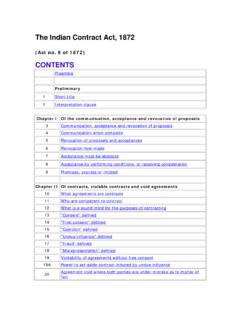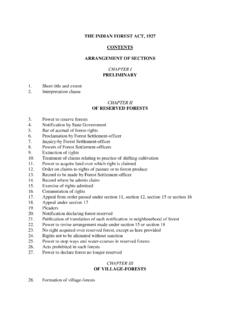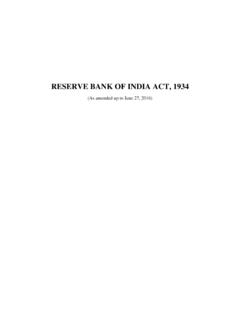Transcription of THE INDIAN PENAL CODE, 1860 ACT NO. 45 OF 1860 1* …
1 THE INDIAN PENAL code , 1860 act NO. 45 OF 1860 1* [6th October, 1860.] CHAPTER I INTRODUCTION CHAPTER I INTRODUCTION it is expedient to provide a general PENAL code for 2*[India]; It is enacted as follows:-- 1. Title and extent of operation of the code . 1. Title and extent of operation of the Act shall be called the INDIAN PENAL code , and shall 3*[extend to the whole of India 4*[except the State of Jammu and Kashmir]]. 2. Punishment of offences committed within India. 2. Punishment of offences committed within person shall be liable to punishment under this code and not otherwise for every act or omission contrary to the provisions thereof, of which he shall be guilty within 5*[India] 6**. 3. Punishment of offences committed beyond, but which by law may be tried within, India. 3. Punishment of offences committed beyond, but which by law may be tried within, person liable, by any 7*[ INDIAN law], to be tried for an offence committed beyond 5*[India] shall be dealt with according to the provisions of this code for any act committed beyond 5*[India] in the same manner as if such act had been committed within 5*[India].
2 4. Extension of code to extra-territorial offences. 8*[4. Extension of code to extra-territorial provisions of this code apply also to any offence committed by-- 9*[(1) any citizen of India in any place without and beyond India; (2) any person on any ship or aircraft registered in India wherever it may be.] ---------------------------------------- ------------------------------ 1. The Act has been amended in its application to Madras by Madras Act 25 of 1960, U. P. by U. P. Acts 31 of 1961, 29 of 1970 and 47 of 1975, Andhra Pradesh by Andhra Pradesh Act 16 of 1968, Maharashtra by Maharashtra Act 19 of 1971, Mysore by Mysore Act 8. of 1972, West Bengal by West Bengal Act 42 of 1973. The Act has been extended to Goa, Daman and Diu with modifications by Reg. 12 of 1962, s. 3 and Sch., extended to and brought INTO force in Dadra and Nagar Haveli by Reg. 6 of 1963, s. 2 and Sch.]
3 I ( 1-7-1965) and to Laccadive, Minicoy and Amindivi Islands by Reg. 8 of 1965, s. 3 and Sch. ( 1-10- 1967). The Act comes INTO force in Pondicherry vide Reg. 7 of 1963, s. 3 and Sch. I ( 1-10-1963). 2. Subs. by Act 3 of 1951, s. 3 and Sch., for "the whole of India except Part B States". 3. Subs. by the A. O. 1948, for "take effect * * * throughout British India". The words and figures "on and FROM the first day of May, 1861" occurring between the words "effect" and "throughout" were rep. by Act 12 of 1891. 4. Subs. by Act 3 of 1951, s. 3 and Sch., for "except Part B States". 5. Subs. by s. 3 and Sch., ibid., for "the States". 6. The words and figures "on or after the said first day of May, 1861" omitted by Act 12 of 1891. 7. Subs. by the A. O. 1937, for "law passed by the Governor-General of India in Council". 8. Subs. by Act 4 of 1898, s. 2, for the original s. 4. 9. Subs.
4 By the A. O. 1950, for the original cls. (1) to (4). 102. Explanation. this section the word "offence" includes every act committed outside 1*[India] which, if committed in 1*[India] would be punishable under this code . 2*[Illustration] 3**A, 4*[who is 5*[a citizen of India]], commits a murder in Uganda. He can be tried and convicted of murder in any place in 1*[India] in which he may be found. 6* * * * * 5. Certain laws not to be affected by this Act. 7*[5. Certain laws not to be affected by this in this Act shall affect the provisions of any Act for punishing mutiny and desertion of officers, soldiers, sailors or airmen in the service of the Government of India or the provision of any special or local law.] CHAPTER II GENERAL EXPLANATIONS 6. Definitions in the code to be understood subject to exceptions. 6. Definitions in the code to be understood subject to this code every definition of an offence, every PENAL provision and every illustration of every such definition or PENAL provision, shall be understood subject to the exceptions contained in the Chapter entitled "General Exceptions", though those exceptions are not repeated in such definition, PENAL provision, or illustration.
5 Illustrations (a) The sections, in this code , which contain definitions of offences, do not express that a child under seven years of age cannot commit such offences; but the definitions are to be understood subject to the general exception which provides that nothing shall be an offence which done by child under seven years of age. (b) A, a police-officer, without warrant, apprehends Z who has committed murder. Here A is not guilty of the offence of wrongful confinement; for he was bound by law to apprehend Z, and therefore the case falls within the general exception which provides that "nothing is an offence which is done by a person who is bound by law to do it". 7. Sense of expression once explained. 7. Sense of expression once expression which is explained in any part of this code , is used in every part of this code in conformity with the explanation. 8. Gender.
6 8. pronoun "he" and its derivatives are used of any person, whether male or female. 9. Number. 9. the contrary appears FROM the context, words importing the singular number include the plural number, and words importing the plural number include the singular number. 10. "Man". "Woman". 10. "Man". "Woman".--The word "man" denotes a male human being of any age; the word "woman" denotes a female human being of any age. ---------------------------------------- ------------------------------ 1. Subs. by Act 3 of 1951, s. 3 and Sch., for "the States". 2. Subs. by Act 36 of 1957, and Sch. II, for "Illustrations". 3. The brackets and letter `6(a) omitted by s. 3 and Sch. II, ibid. 4. Subs. by the A. O. 1948, for "a coolie, who is a Native INDIAN subject". 5. Subs. by the A. O. 1950, for "a British subject of INDIAN domicile". 6. Illustrations (b), (c) and (d) were rep.
7 By the A. O. 1950. 7. Subs., ibid., for the former s. 5. 103. 11. "Person". 11. "Person".--The word "person" includes any Company or Association or body of persons, whether incorporated or not. 12. "Public". 12. "Public".--The word "public" includes any class of the public or any community. 13. [Definition of "Queen".] Rep. by the A. O. 1950. 14. "Servant of Government". 1*[14. "Servant of Government".--The words "servant of Government" denote any officer or servant continued, appointed or employed in India by or under the authority of Government.] 15. [Definition of "British India".] Rep. by the A. O. 1937. 16. Definition of "Government of India".] Rep., ibid. 17. "Government". 2*[17 "Government".--The word "Government" denotes the Central Government or the Government of a 3**State.] 18. "India". 4*[18. "India".--"India" means the territory of India excluding the State of Jammu and Kashmir.
8 ] 19. "Judge". 19. "Judge".--The word "Judge" denotes not only every person who is officially designated as a Judge, but also every person. who is empowered by law to give, in any legal proceeding, civil or criminal, a definitive judgment, or a judgment which, if not appealed against, would be definitive, or a judgment which, if confirmed by some other authority, would be definitive, or who is one of a body of persons, which body of persons is empowered by law to give such a judgment. Illustrations (a) A collector exercising jurisdiction in a suit under Act 10 of 1859, is a Judge. (b) A Magistrate exercising jurisdiction in respect of a charge on which he has power to sentence to fine or imprisonment with or without appeal, is a Judge. (c) A member of a panchayat which has power, under 5*Regulation VII, 1816, of the Madras code , to try and determine suit, is a Judge. (d) A Magistrate exercising jurisdiction in respect of a charge on which he has power only to commit for trial to another Court, is not a Judge.
9 20. "Court of Justice". 20. "Court of Justice".--The words "Court of Jutsice" denote a Judge who is empowered by law to act judicially alone, or a body of Judges which is empowered by law to act judicially as a body, when such Judge or body of Judges is acting judicially. Illustration A Panchayat acting under 5*Regulation VII, 1816, of the Madras code , HAVING power to try and determine suits, is a Court of Justice. ---------------------------------------- ----------------------------- 1. Subs. by the A. O. 1950, for s. 14. 2. Subs., ibid., for s. 17. 3. The words and letter "Part A" omitted by Act 3 of 1951, s. 3 and Sch. 4. Subs. by s. 3 and Sch., ibid., for s. 18. 5. Rep. by the Madras Civil Courts Act, 1873 (3 of 1873). 104. 21. "Public servant". 21. "Public servant".--The words "public servant" denote a person falling under any of the descriptions hereinafter following, namely:-- 1* * * * * Commissioned Officer in the Military, 2*[Naval or Air] Forces 3*[4** of India]; 5*[ Judge including any person empowered by law to discharge, whether by himself or as a member of any body of persons.]
10 Any adjudicatory functions;] officer of a Court of Justice 6*[(including a liquidator, receiver or commissioner)] whose duty it is, as such officer, to investigate or report on any matter of law or fact, or to make, authenticate, or keep any document, or to take charge or dispose of any property, or to execute any judicial process, or to administer any oath, or to interpret, or to preserve ORDER in the Court, and every person specially authorized by a Court of Justice to perform any of such duties; juryman, assessor, or member of a panchayat assisting a Court of Justice or public servant; arbitrator or other person to whom any cause or matter has been referred for decision or report by any Court of Justice, or by any other competent public authority; person who holds any office by virtue of which he is empowered to place or keep any person in confinement; officer of 7*[the Government] whose duty it is, as such officer, to prevent offences, to give information of offences, to bring offenders to justice, or to protect the public health, safety or convenience; officer whose duty it is as such officer, to take, receive, keep or expend any property on behalf of 7*[the Government], or to make any survey, assessment or contract on behalf of 7*[the Government], or to execute any revenue- process, or to investigate, or to report, on any matter affecting the pecuniary interests of 7*[the Government], or to make.
















